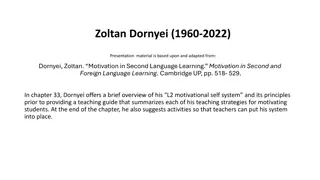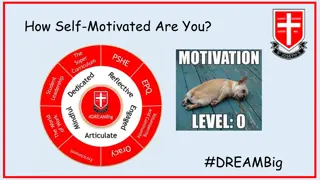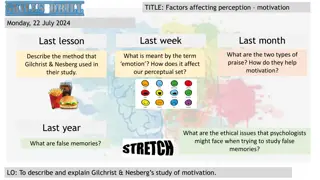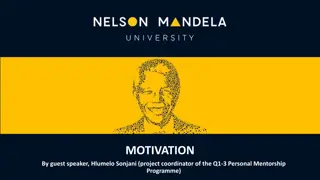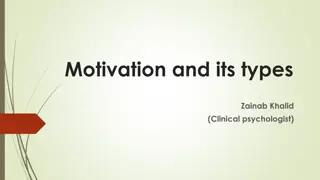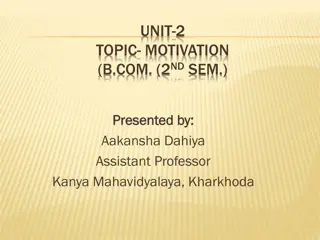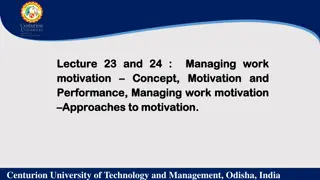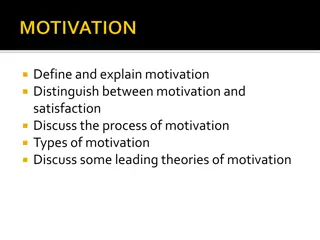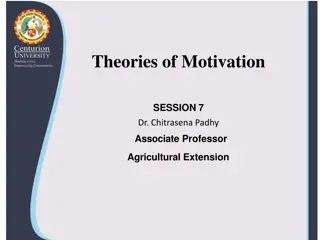
Motivation: Types, Factors, and Roles
Explore the concept of motivation, its types - intrinsic and extrinsic, the roles it plays in goal achievement, and the factors influencing motivation including goals, beliefs, self-efficacy, social support, interest, rewards, and personal growth.
Download Presentation

Please find below an Image/Link to download the presentation.
The content on the website is provided AS IS for your information and personal use only. It may not be sold, licensed, or shared on other websites without obtaining consent from the author. If you encounter any issues during the download, it is possible that the publisher has removed the file from their server.
You are allowed to download the files provided on this website for personal or commercial use, subject to the condition that they are used lawfully. All files are the property of their respective owners.
The content on the website is provided AS IS for your information and personal use only. It may not be sold, licensed, or shared on other websites without obtaining consent from the author.
E N D
Presentation Transcript
HUMAN VALUES AND HUMAN VALUES AND ETHICS ETHICS Lecture No. 9 Lecture No. 9 Motivation Motivation Dwity Sundar Rout Dwity Sundar Rout Assistant Professor Assistant Professor Department of Department of Agril Agril. Extension Education . Extension Education Centurion University of Technology and Management, Odisha, India
Motivation Motivation refers to the internal or external factors that drive and direct our behavior towards achieving a particular goal or outcome. It is the force that compels us to act, persist, and put in effort to accomplish something. Motivation can come from a variety of sources, including personal desires, aspirations, values, external rewards, and the influence of others. Centurion University of Technology and Management, Odisha, India
Roles of motivation Motivation plays a crucial role in determining the level of effort and commitment we put into our tasks or objectives. When we are motivated, we are more likely to set challenging goals, exhibit persistence in the face of obstacles, and maintain focus and enthusiasm. On the other hand, a lack of motivation can lead to procrastination, decreased effort, and ultimately, failure to achieve our goals. Centurion University of Technology and Management, Odisha, India
Types of motivation There are two main types of motivation: intrinsic and extrinsic. Intrinsic motivation comes from within oneself and is driven by internal factors such as personal interest, enjoyment, or a sense of accomplishment. It involves engaging in an activity for its own sake, deriving satisfaction from the process itself. Extrinsic motivation, on the other hand, stems from external factors such as rewards, recognition, or consequences. It involves performing a task to obtain external rewards or avoid punishment. Centurion University of Technology and Management, Odisha, India
Factors influence motivation 1.Goals: Setting clear, challenging, and meaningful goals can provide a sense of direction and purpose, fueling motivation. 2.Beliefs and values: Aligning our actions with our beliefs and values can create a sense of significance and drive our motivation. 3.Self-efficacy: Believing in our own abilities and having confidence in our capacity to succeed can enhance motivation. 4.Social support: Positive encouragement, feedback, and support from others can boost motivation and provide accountability. 5.Interest and enjoyment: Finding activities that genuinely interest and bring enjoyment can increase intrinsic motivation. 6.External rewards and recognition: Tangible rewards, such as money or prizes, as well as acknowledgment and praise, can provide extrinsic motivation. 7.Personal growth and development: The desire for self-improvement, learning, and growth can be a powerful motivator. Centurion University of Technology and Management, Odisha, India
Conclusion Motivation can fluctuate over time and vary across different tasks or contexts. Cultivating and sustaining motivation often involves understanding our own drivers and employing strategies such as goal setting, positive self-talk, breaking tasks into smaller, manageable steps, and seeking support from others when needed. Centurion University of Technology and Management, Odisha, India
Thank you Centurion University of Technology and Management, Odisha, India


